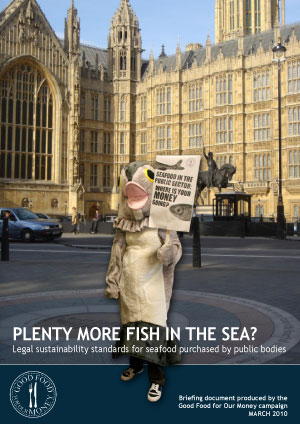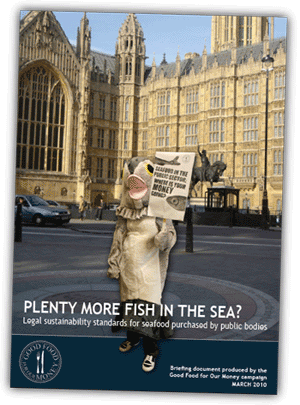
Plenty more fish in the sea - legal sustainability standards for seafood purchased by public bodies
3pp - 2010 | 487Kb


Plenty more fish in the sea - legal sustainability standards for seafood purchased by public bodies
3pp - 2010 | 487Kb
 In this briefing document, Sustain's Good Food for Our Money campaign called on Government to support the “Public Bodies (Procurement of Seafood) Bill”, introduced to Parliament by David Drew MP on 24 February 2010. This Bill would legally require that all seafood purchased by the public sector is proven to have come from sustainable sources.
In this briefing document, Sustain's Good Food for Our Money campaign called on Government to support the “Public Bodies (Procurement of Seafood) Bill”, introduced to Parliament by David Drew MP on 24 February 2010. This Bill would legally require that all seafood purchased by the public sector is proven to have come from sustainable sources.
A briefing document produced by the Good Food for Our Money campaign.
The international threat to seafood, particularly some fish species, is well-documented. There is consensus that fish stocks need careful management and a recognition that fisheries that are over-exploited can collapse suddenly and with irreversible damage. For example, a collapse of this kind occurred off the east coast of Newfoundland in 1992 when cod stocks vanished, the local industry evaporated and 40,000 people lost their jobs. Even now, the cod have not returned.
Data from the United Nations Fisheries and Aquaculture Department paints a very bleak picture for the state of our oceans. It estimates that 80% of the world’s fish stocks for which assessment information is available are reported as fully exploited or over-exploited and, thus, requiring effective and precautionary management.
In British waters, we face an urgent problem. In the North East Atlantic, the majority of commercial stocks are fully exploited, overexploited or depleted, while British salmon stocks are considered to be fully or over exploited and North Sea plaice, cod and sole are considered to be outside safe biological limits.
The public sector is a big consumer of seafood, but it is not an ethical consumer of seafood. At the time of this briefing paper, public sector organisations were not required to meet ANY legally binding sustainability standard for the seafood that it buys. There is government guidance, but no rules. In fact, the government did not even require the public sector to meet the rules it introduced under the ‘Fish Labelling Regulations’, by which retailers must clearly label the origin and species, including the method of production, for all fish and fillets sold. Because of this, public sector organisations, often unknowingly, are buying unsustainable seafood. Some examples of this include the purchase of haddock in prison food without any assurance of its sustainability, and the serving of tiger prawns, dogfish and swordfish – which are often produced particularly unsustainably – in hospitals and to our armed forces.
This briefing paper sets out the case for legislation, to ensure that the public sector plays its role in conserving precious marine resources, and good livelihoods in fishing, for years to come.
Good Food for Our Money Campaign: The Good Food for Our Money campaign ran from 2008 to 2011. After several notable successes, this campaign has now evolved to focus on winning healthy and sustainable food standards for hospital food, in parallel with Sustain's existing work on the Children's Food Campaign to secure healthy and sustainable food standards for school meals.
Sustain
The Green House
244-254 Cambridge Heath Road
London E2 9DA
020 3559 6777
sustain@sustainweb.org
Sustain advocates food and agriculture policies and practices that enhance the health and welfare of people and animals, improve the working and living environment, promote equity and enrich society and culture.
© Sustain 2026
Registered charity (no. 1018643)
Data privacy & cookies
Icons by Icons8